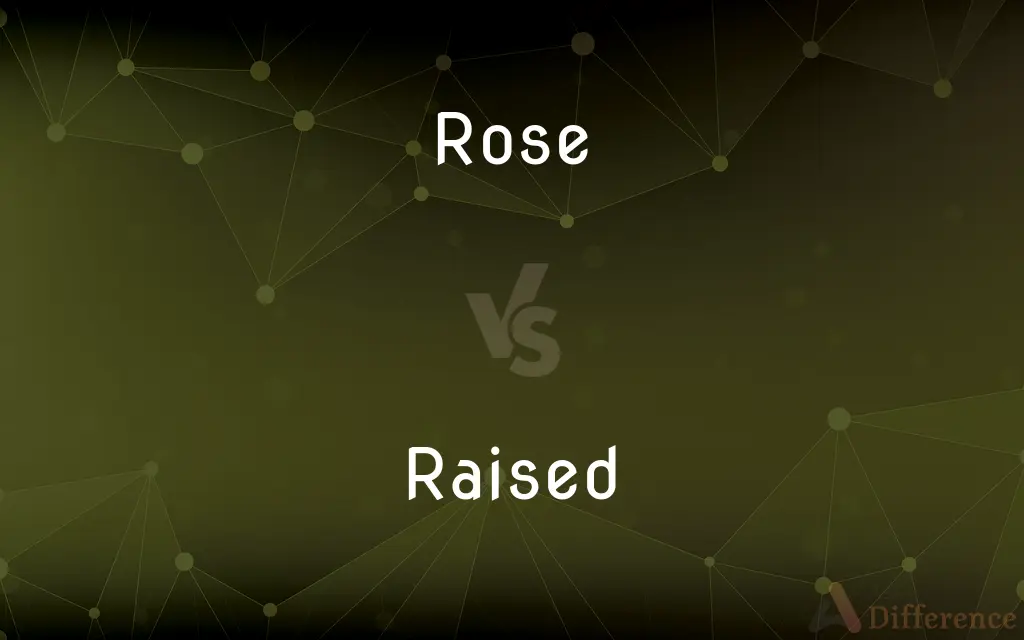Rose vs. Raised — What's the Difference?
By Urooj Arif & Fiza Rafique — Updated on March 27, 2024
Rose refers to the past tense of "rise," indicating upward movement, while Raised is the past tense of "raise," implying an action performed to lift something.

Difference Between Rose and Raised
Table of Contents
ADVERTISEMENT
Key Differences
Rose is the simple past tense of "rise," which means to move from a lower to a higher position or to come into being without external force. For example, "The sun rose at 6:00 AM," signifies a natural, unaided upward movement. On the other hand, Raised is the past tense and past participle of "raise," denoting the action of moving something to a higher position through an external effort, as in "She raised her hand to ask a question." This action requires an agent to perform the lifting or elevating.
While "rose" is used to describe actions that are typically self-initiated or natural occurrences, such as the rising of celestial bodies or the act of standing up, "raised" is applied to situations where an object, a figure, or a quantity is lifted or elevated by someone or something else. For instance, "The curtain rose at the beginning of the play," compared to "The director raised the curtain to signal the start of the performance."
The difference also extends to metaphorical uses. "Rose" can symbolize emergence or growth, as in "A new leader rose from the ranks." Conversely, "raised" often relates to the development or nurturing of something by external efforts, such as in "They raised funds for the new library."
Rose implies a smooth, continuous motion or a gradual emergence, whereas "raised" suggests a deliberate act of lifting or increasing. For example, "Mist rose from the lake at dawn," versus "He raised the flag as a sign of victory."
Understanding the distinction between "rose" and "raised" is crucial for their correct usage in expressing specific actions or phenomena. "Rose" reflects a natural or autonomous ascent, while "raised" emphasizes an action undertaken to elevate or increase something.
ADVERTISEMENT
Comparison Chart
Definition
Past tense of "rise," indicating upward movement without external assistance.
Past tense of "raise," meaning to lift or elevate something with effort.
Usage
Describes self-initiated or natural movements.
Refers to actions that lift or elevate through external force.
Example
"The sun rose in the east."
"She raised the window to get some air."
Context
Often used for natural or autonomous occurrences.
Used when an object or subject is elevated by someone or something.
Metaphorical sense
Symbolizes emergence, growth, or coming into existence.
Relates to nurturing, development, or lifting by effort.
Compare with Definitions
Rose
Past tense of "rise," meaning to ascend or go up naturally.
The balloon rose higher as the air inside it warmed.
Raised
To increase a quantity or level.
The company raised prices in response to increased demand.
Rose
Awakening or standing up.
He rose early to prepare for the day ahead.
Raised
Past tense of "raise," meaning to lift something up.
They raised the banner in celebration of the victory.
Rose
To come into existence or prominence without direct help.
A sense of hope rose within the community after the announcement.
Raised
To bring up or nurture.
She has raised four children on her own.
Rose
Increase in rank or status autonomously.
She rose to the position of CEO after years of dedication.
Raised
To elevate in rank or position by someone's action.
The board raised him to the position of managing director.
Rose
Originating or stemming from a source.
A new genre of music rose from the cultural exchange.
Raised
To cultivate or grow something through effort.
They raised a variety of crops on their farm.
Rose
A rose is a woody perennial flowering plant of the genus Rosa, in the family Rosaceae, or the flower it bears. There are over three hundred species and tens of thousands of cultivars.
Raised
Projecting from a flat background; in relief; embossed
A raised design.
Rose
Any light pink wine, coloured by only brief contact with red grape skins
A local rosé wine
A glass of rosé
Raised
Made light and high by yeast or other leaven.
Rose
Make rosy
A warm flush now rosed her hitherto blue cheeks
Raised
Simple past tense and past participle of raise
Rose
Any of numerous shrubs or vines of the genus Rosa, having prickly stems and pinnately compound leaves, widely cultivated for their showy, often fragrant flowers.
Raised
Embossed, in relief.
Rose
The flower of any of these plants.
Raised
Lifted up; showing above the surroundings; as, raised or embossed metal work.
Rose
Any of various other plants, especially one having similar flowers.
Raised
Above the surround or above the normal position;
A raised design
Raised eyebrows
Rose
A member of the rose family.
Raised
Embellished with a raised pattern created by pressure or embroidery;
Brocaded silk
An embossed satin
Embossed leather
Raised needlework
Raised metalwork
Rose
A dark pink to moderate red.
Raised
Leavened usually with yeast;
Raised bread
Rose
An ornament, such as a decorative knot, resembling a rose in form; a rosette.
Raised
Increased especially to abnormal levels;
The raised prices frightened away customers
Inflated wages
An inflated economy
Rose
A perforated nozzle for spraying water from a hose or sprinkling can.
Rose
A form of gem cut marked by a flat base and a faceted, hemispheric upper surface.
Rose
A gem, especially a diamond, cut in this manner.
Rose
A rose window.
Rose
A compass card or its representation, as on a map.
Rose
Roses That which is marked by favor, success, or ease of execution
Directing this play has been all roses since the new producer took over.
Rose
A light pink wine made from purple grapes, with the skins being removed from the juice during fermentation as soon as the desired color has been attained.
Rose
Of the color rose.
Rose
Relating to, containing, or used for roses.
Rose
Scented or flavored with or as if with roses.
Rose
Past tense of rise.
Rose
A shrub of the genus Rosa, with red, pink, white or yellow flowers.
Rose
A flower of the rose plant.
Rose
A plant or species in the rose family. (Rosaceae)
Rose
Something resembling a rose flower.
Rose
(heraldry) The rose flower, usually depicted with five petals, five barbs, and a circular seed.
Rose
A purplish-red or pink colour, the colour of some rose flowers.
Rose
A round nozzle for a sprinkling can or hose.
Rose
The usually circular base of a light socket in the ceiling, from which the fitting or chandelier is suspended.
Rose
Any of various large, red-bodied, papilionid butterflies of the genus Pachliopta.
Rose
(mathematics) Any of various flower-like polar graphs of sinusoids or their squares. Category:en:Curves
Rose
A graph with only one vertex.
Rose
Alternative spelling of rosé
Rose
To make rose-coloured; to redden or flush.
Rose
To perfume, as with roses.
Rose
Past participle of rise
Rose
Having a purplish-red or pink colour. See rosy.
Rose
A flower and shrub of any species of the genus Rosa, of which there are many species, mostly found in the morthern hemispere
Rose
A knot of ribbon formed like a rose; a rose knot; a rosette, esp. one worn on a shoe.
Rose
A rose window. See Rose window, below.
Rose
A perforated nozzle, as of a pipe, spout, etc., for delivering water in fine jets; a rosehead; also, a strainer at the foot of a pump.
Rose
The erysipelas.
Rose
The card of the mariner's compass; also, a circular card with radiating lines, used in other instruments.
Rose
The color of a rose; rose-red; pink.
Rose
A diamond. See Rose diamond, below.
Rose
To render rose-colored; to redden; to flush.
Rose
To perfume, as with roses.
Rose
Any of many plants of the genus Rosa
Rose
Pinkish table wine from red grapes whose skins were removed after fermentation began
Rose
A dusty pink color
Rose
Having a dusty purplish pink color;
The roseate glow of dawn
Common Curiosities
In what situations is "raised" the correct term to use?
"Raised" is appropriate when discussing lifting objects, elevating positions, or increasing quantities through external actions.
Can "rose" be used metaphorically?
Yes, "rose" can symbolize emergence, growth, or coming into prominence in a metaphorical sense.
How does "raised" function in a metaphorical context?
"Raised" can metaphorically relate to nurturing or developing something through concerted efforts.
What does "rose" indicate in a sentence?
"Rose" indicates a natural or self-initiated upward movement or growth.
Does "rose" imply effort?
"Rose" typically does not imply external effort; it suggests a natural or autonomous action.
What does it mean when someone is "raised" to a higher position?
It means someone was elevated to a higher position through the decision or action of others.
Can "rose" refer to the past action of getting out of bed?
Yes, "rose" can describe the action of getting out of bed in the past tense.
How is "raised" used differently from "rose"?
"Raised" is used to describe an action where something is lifted or elevated through external effort.
What are examples of natural occurrences where "rose" is appropriate?
Examples include the sun rising, fog lifting, or a person standing up without assistance.
Can "rose" and "raised" be used interchangeably?
No, they cannot be used interchangeably due to their distinct meanings and usage contexts.
Can objects "rose" on their own, or do they need to be "raised"?
Objects do not "rose"; they need to be "raised" through an external action.
Is there a physical difference in the actions described by "rose" and "raised"?
Yes, "rose" describes a self-ascending action, while "raised" indicates lifting or elevating something through external means.
How do "rose" and "raised" relate to leadership and authority?
"Rose" might refer to gaining a position through personal growth, while "raised" suggests being appointed to it by others.
What is a common mistake in using "rose" and "raised"?
A common mistake is using "raised" when referring to natural or autonomous actions, where "rose" would be correct.
What role does context play in choosing between "rose" and "raised"?
Context is crucial; it determines whether the focus is on an autonomous action or one that requires external effort.
Share Your Discovery

Previous Comparison
Taut vs. Tight
Next Comparison
Advertisement vs. CommercialAuthor Spotlight
Written by
Urooj ArifUrooj is a skilled content writer at Ask Difference, known for her exceptional ability to simplify complex topics into engaging and informative content. With a passion for research and a flair for clear, concise writing, she consistently delivers articles that resonate with our diverse audience.
Co-written by
Fiza RafiqueFiza Rafique is a skilled content writer at AskDifference.com, where she meticulously refines and enhances written pieces. Drawing from her vast editorial expertise, Fiza ensures clarity, accuracy, and precision in every article. Passionate about language, she continually seeks to elevate the quality of content for readers worldwide.















































